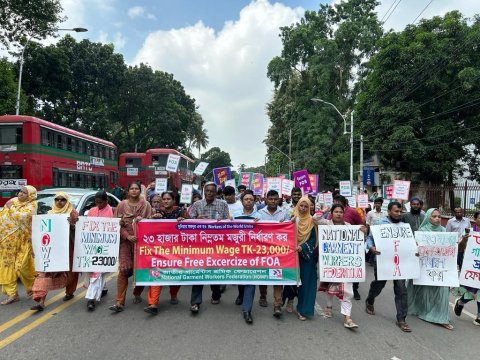
Photo: National Garment Workers Federation (NGWF).
Tensions in Bangladesh are high as the minimum wage for garment workers has just been reviewed and adjusted for the first time in five years through an un-transparent and biased process.
The current monthly minimum wage of 8,000 Taka (approximately US$72) was already insufficient for a decent living when it came into force almost five years ago in 2019. Since then, workers have only received a small increment and have endured the additional pressure of the Covid-19 pandemic and the subsequent high inflation.
Unions in Bangladesh are calling for a minimum wage of 23,000 Taka (US$207) per month, which studies have estimated as the bare minimum needed for a decent living. Meanwhile, employers proposed a new minimum wage of less than half that, which would have left garment workers unable to cover their basic needs.
On November 7, the Labour Minister announced that the new minimum wage would be 12,500 Taka (US$113), only slightly above the factory owners’ proposal and far below a living wage for workers.
Workers have responded by organizing massive protests to demand a living wage, facing extreme risks as they do so. At least four workers have been killed and union leaders are being arrested and/or investigated. The recent murder of trade unionist Shahidul Islam is another stark reminder of the repressive environment in which these wage negotiations are taking place.
MSN joins Bangladeshi unions and international allies in condemning the violence and supporting garment workers’ right to organize for a more just minimum wage.
We join with other Clean Clothes Campaign members in calling on the Bangladeshi government to support the rights to protest, freedom of association, and a living wage. We also call on all brands sourcing from Bangladesh to immediately condemn the violence used against workers demanding a minimum wage of 23,000 Taka, confirm their commitment to fair pricing, call for the demands of workers and independent trade unions to be heard, and ensure that workers’ right to freedom of association is protected.
Minimum wage campaign and updates
- Disastrous Outcome on Wages Made Worse by the Price Workers Are Paying for Speaking out (WRC)
- Ahead of Black Friday, Support Zoya and Other Bangladesh Garment Workers (HRW)
- Why don't RMG owners pressurise buyers instead of workers?
- Minimum wage protests continue in Bangladesh (IndustriALL)
- Too poor? Shut up and work harder! How the BGMEA president tries to gloss over poverty wages (CCC)
- Bangladesh government proposes new poverty wage of 12,500 BDT ($113) per month, ignoring the workers’ desperate calls (CCC)
- CCC condemns repression against workers protesting for higher wages in Bangladesh
- Bangladesh Minimum Wage talks on the brink of failure? Employers table an outrageous monthly wage offer of $95 as brands remain silent (CCC)
- CCC Minimum Wage Campaign Page
Background information on the need for higher wages in Bangladesh